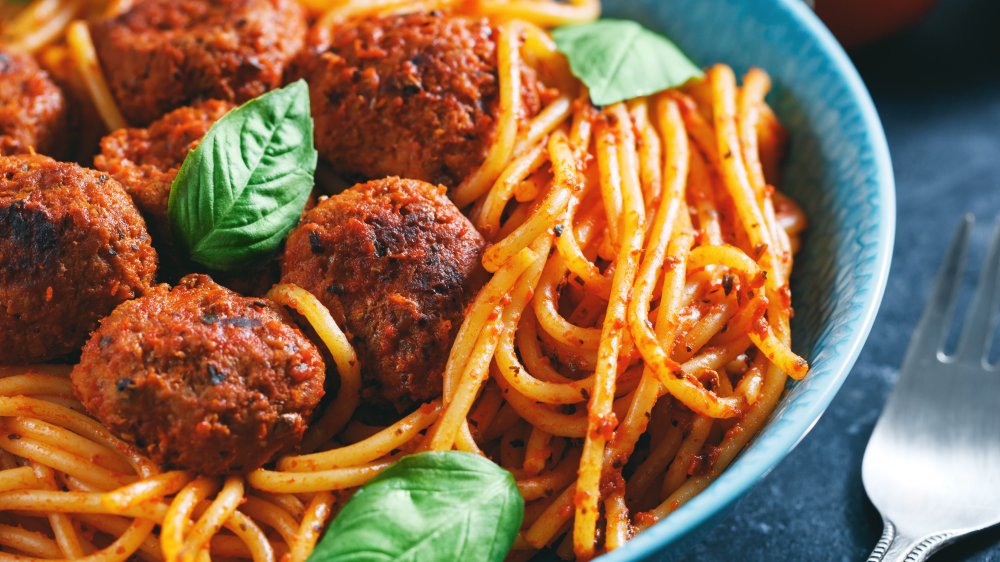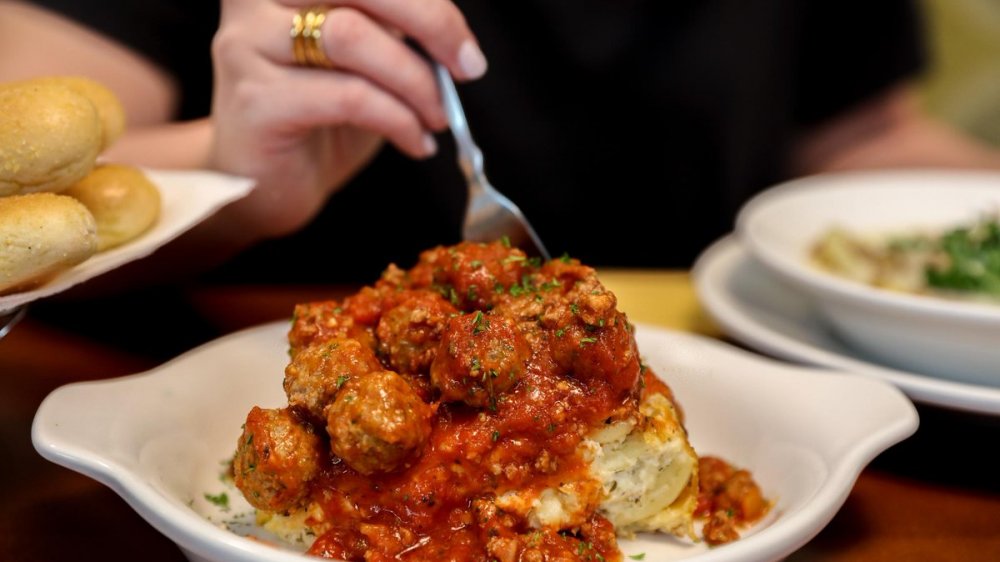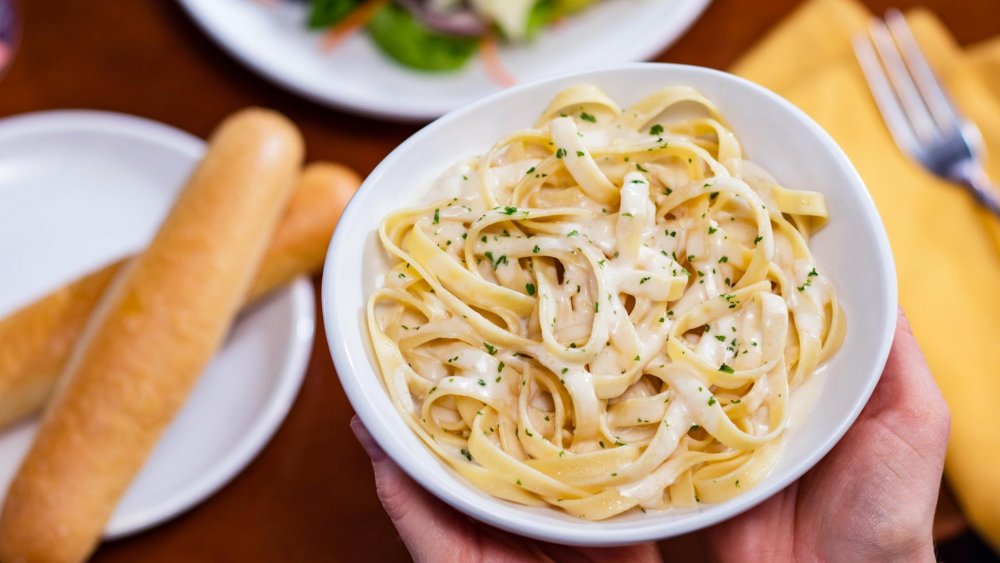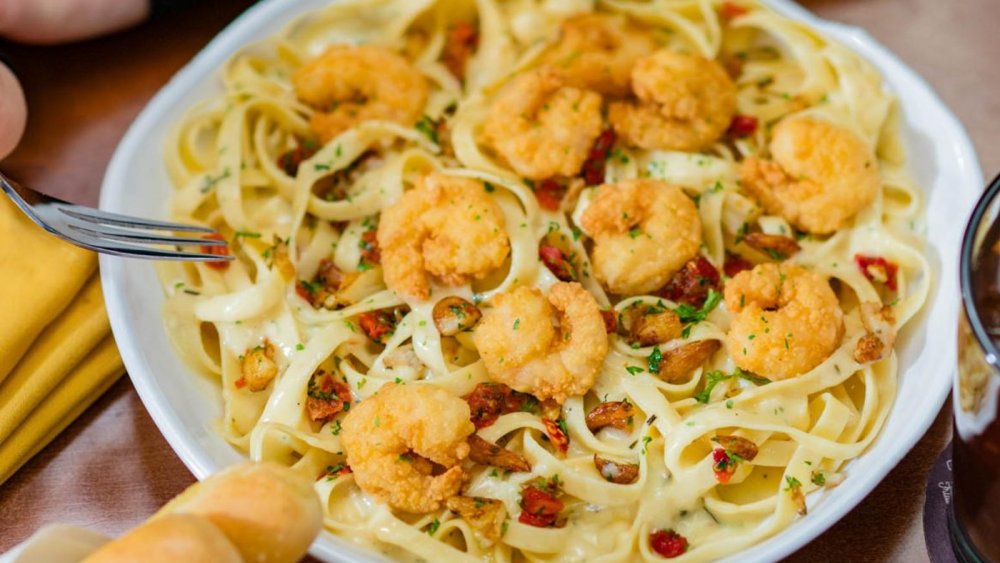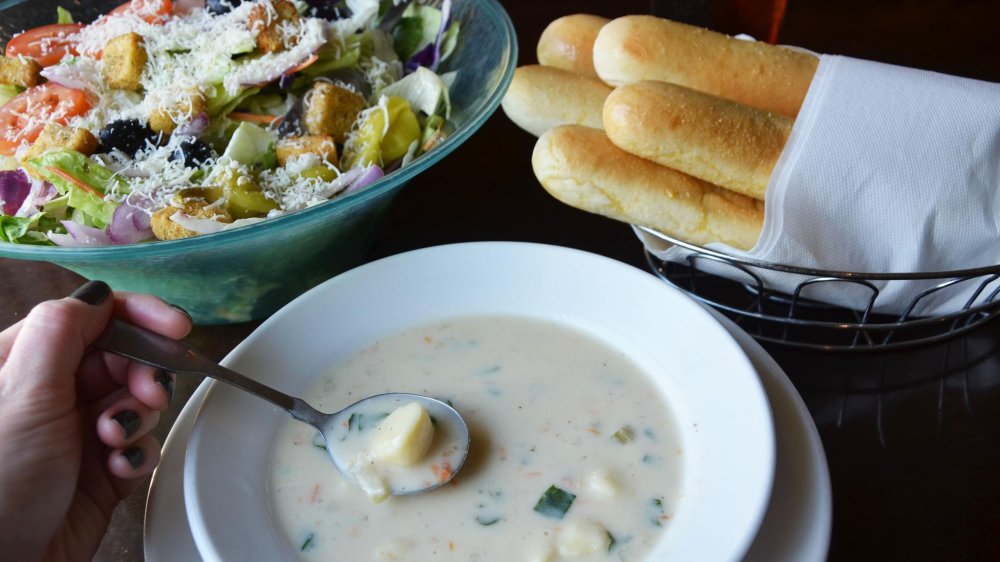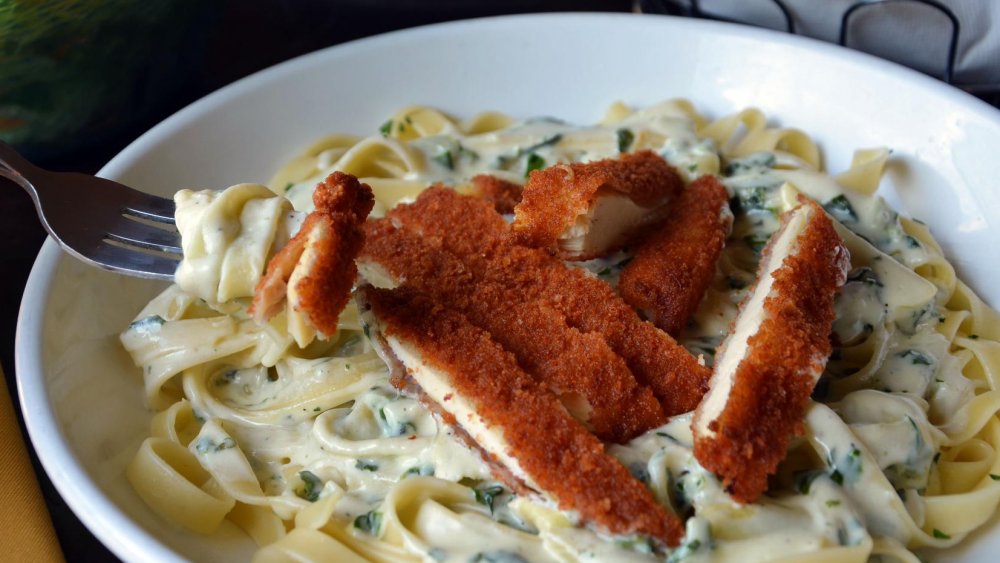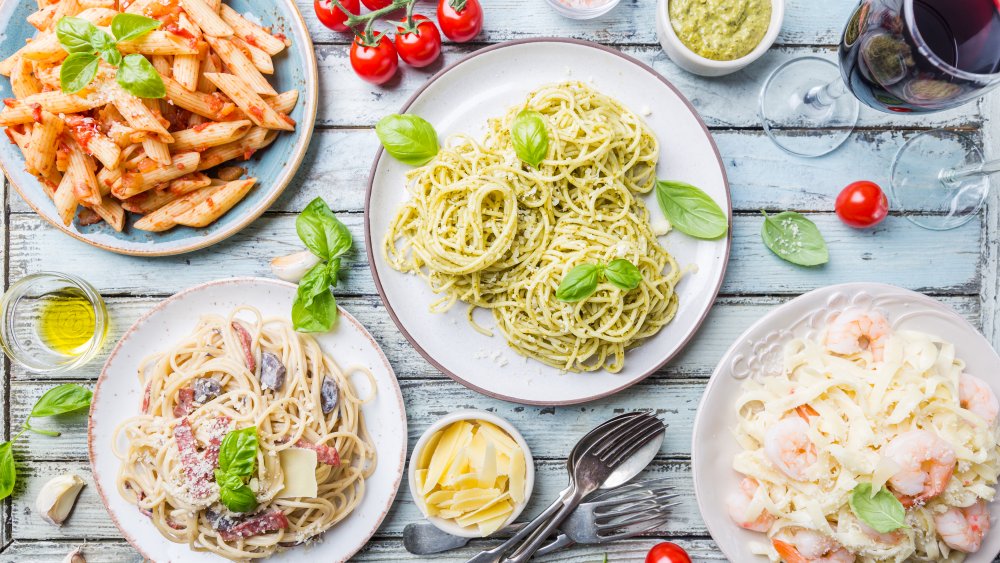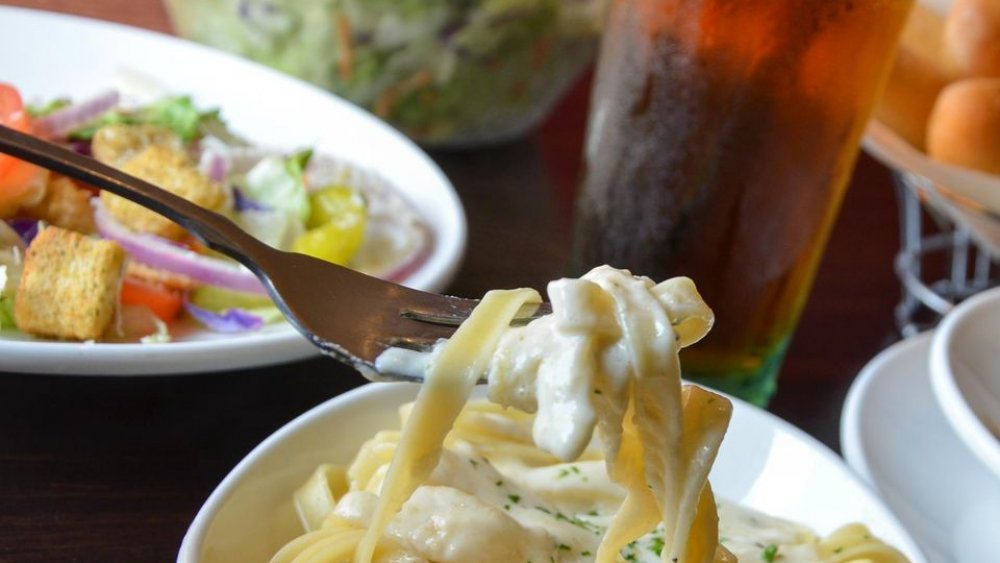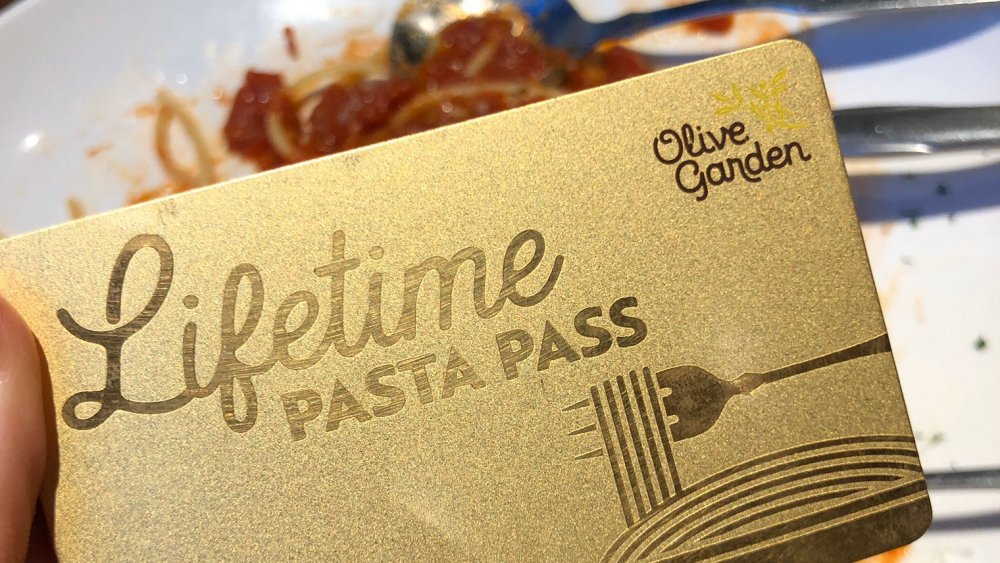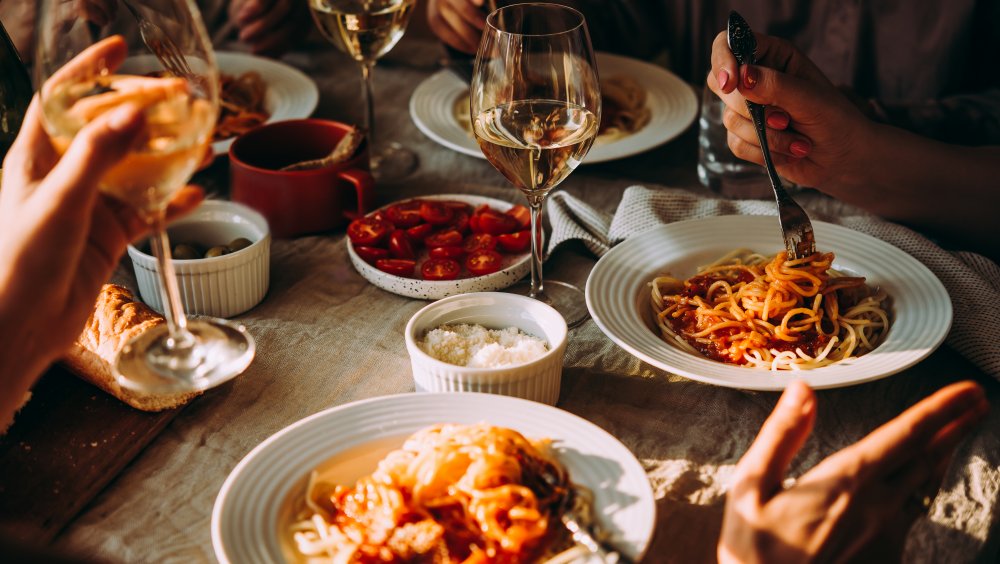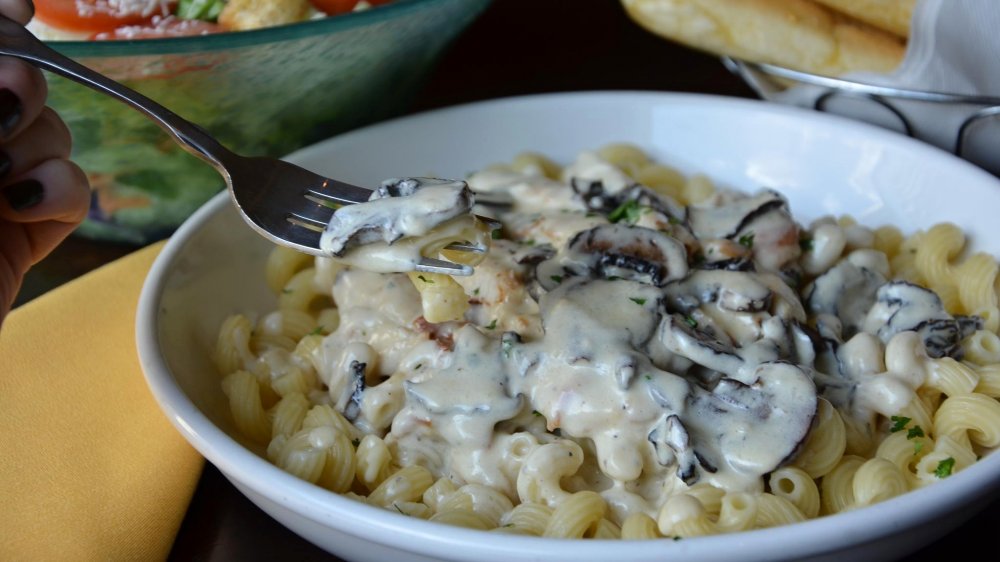The Truth About Olive Garden's Never Ending Pasta Bowl
Olive Garden has had more twists and turns than a forkful of coiled-up spaghetti. The chain restaurant has often been dismissed as phony Italian, and it's a fair criticism. Authenticity has never been a hallmark of Olive Garden, and in a misguided attempt to convince doubters the restaurant was a place for serious foodies, some dishes were totally fabricated. And even the chain's devoted regulars didn't go for the phony-baloney stuff, preferring the more recognizable Italian-American fare, like ravioli, and Olive Garden's finances took a nosedive.
The restaurant had a major success, however, when it introduced the concept of the Never Ending Pasta Bowl in 1995 — and it's Olive Garden's most financially successful promotion. Fans were so wildly devoted to the Never Ending Pasta Bowl that nabbing one of the 50 Lifetime Passes in 2019 turned into a blood sport. If you've never indulged in this pasta-lover's dream-come-true, and you're wondering what all the fuss is about, here's everything you'll ever need to know about Olive Garden's Never Ending Pasta Bowl.
The Never Ending Pasta Bowl saved Olive Garden
The initial seven-week promotion pasta fest was so popular, Olive Garden introduced Never Ending Pasta Bowl passes a year later — allowing buyers unlimited visits during the promotional period. For the next four years, the Never Ending Pasta Bowl passes sold out in minutes. But in 2019 Olive Garden's nationwide sales had risen a paltry 1.5 percent, and, as reported by the New York Post, stock shares plummeted 5 percent. Olive Garden management had depended on the annual uptick in sales from the Never Ending Pasta Bowl and didn't account for the necessary additional marketing funds. Olive Garden's patrons were fleeing to more aggressive competitors, like Applebee's, and when furniture store IKEA spent big bucks to promote its Swedish meatballs, CEO Gene Lee finally saw the light. Sort of.
Olive Garden launched a new promotion for a customizable lasagna — "Lasagna Mia" — and for $5 more, diners could get a second entree to go. But again, Olive Garden didn't spend enough money to promote Lasagna Mia, and it failed to be the much-needed cash cow. In August 2019, Olive Garden increased the number of passes to the Never Ending Pasta Bowl to 24,000, and thanks to a savvy social media campaign, introduced the Lifetime pass for $400, which sold out instantly. Olive Garden discontinued the Never Ending Pasta Bowl in 2020 due to the pandemic, but since it's saved the restaurant in the past, it's likely it will come to the rescue again.
Is the Never Ending Pasta Bowl really a good deal?
The Never Ending Pasta Bowl Pass sells for $100 and is only good for the nine-week period that the Olive Garden schedules, usually August through November, but you can go as often as you like during those nine weeks. At first, it seems like a good deal. But let's add up all the costs. The Never Ending Pasta Bowl goes for $10.99, and it includes unlimited soup or salad and breadsticks. You can order as many dishes as you like, but anything else — including drinks — is extra. According to The Simple Dollar, a "bottomless" soft drink is $2.99, and juice, coffee, and tea range between $2 and $5, as listed on Olive Garden's menu. When you throw in tax and tip, that's an extra $6 or $7 added to your bill. So for the Never Ending Pasta Bowl to be worth it, you'd have to go 18 times in nine weeks just to break even.
Still, it averages out to about two bucks per meal, and the more often you dine at Olive Garden, the more savings you accrue. As reported by Business Insider, one particularly determined pasta fanatic in Florida ate 140 pasta meals in 56 days. "Some people would say that's the most obnoxious thing on earth," he said. "I would agree. I'm as far away from normal as you can go." Perhaps. But this obsessed Floridian calculated that he saved over $2,000 during the pasta promotion.
Each Never Ending Pasta Bowl can be different
One of the most alluring features of the Never Ending Pasta Bowl — and why it's enduringly popular — is the variety of choices. Although some of the items are the same as those on the main menu (via Money), the Never Ending Pasta Bowl menu is actually a sub-menu that's only available to pass holders or people ordering the Pasta Bowl for just one night during the promotional period. You start by choosing one of the eight kinds of pasta (gluten-free rotini was a recent addition), one of the five sauces, and finish it off with one of six toppings, all of which could be a hearty meal by itself. So if you do the math, theoretically, you could have 391 bowls of pasta (via Eater), and each one would be different.
The menu for the Never Ending Pasta Bowl isn't fixed in stone, however, and Olive Garden makes fairly regular changes, like adding "zoodles" (zucchini noodles) to the pasta choices or creamy roasted garlic sauce. And just because you chose spaghetti and marinara with meatballs for your first bowl doesn't mean you can't switch it up for your second (or third) bowl and dive into something completely different.
Soup, salad, and breadsticks are included
The Never Ending Pasta Bowl isn't just about bowl after bowl of unlimited pasta. The deal also includes your choice of unlimited soup or salad, and it wouldn't be a complete meal at Olive Garden without the famous — and also unlimited — breadsticks. Olive Garden has never released the secret recipe for those ridiculously delicious breadsticks, but there are plenty of copycat recipes for them. There's nothing really special about the breadsticks themselves — it's just a standard bread recipe. But what makes Olive Garden's breadsticks so delectable is that shiny and salty butter-garlic glaze that's slathered on when they're hot out of the oven.
For a while, Olive Garden's investors thought too many breadsticks were being served (per Washington Post) and ordered that they would be limited to one per guest. That policy bombed, and although thousands of breadsticks go to waste each night (via Food and Wine), they're still loaded on at every table. Olive Garden's unlimited soup and salad selections are justifiably famous, and you could easily fill up on them before your first bowl of pasta arrives.
The best way to get through even one bowl of pasta is to skip the breadsticks, and nibble on the salad or soup (you can take it home). Most likely the server will ask if you want a second bowl before you've finished the first bowl (per Money), so pace yourself. No need to scarf it down because more will be on the way.
Those tasty Never Ending Pasta Bowl toppings will cost you extra
If you don't feel like springing for the 100-plus bucks for the Never Ending Pasta Bowl pass, you can still get the Never Ending Pasta Bowl for $10.99 (plus tax) for one visit at lunch or dinner during the promotional period. Everything's included — breadsticks, soup or salad, unlimited bowls of pasta and sauce — except the toppings. Olive Garden hasn't changed the toppings since it started the Never Ending Pasta Bowl in 1995, and they're all some sort of protein: meatballs, Italian sausage, sauteed shrimp, sauteed chicken, chicken fritta (basically, chicken parm without the sauce and cheese), and shrimp fritta (battered and deep-fried). In 2018 Garden Veggies was added as an optional topping (although it's currently not on Olive Garden's website menu).
The toppings vary in price, so each new bowl of pasta you order could be a little more or less than the previous one. So, if you're like an intrepid reporter for Delish who ordered five bowls of pasta with toppings (over an eight-hour period, mind you), you might have some sticker shock when the server hands you the check for 25 bucks, not including soft drinks or wine. If you're craving a carb load at Olive Garden, be aware that it won't be as cheap as you thought.
The second and third bowls will be smaller portions
Olive Garden — like The Cheesecake Factory — is famous (or infamous, depending on your perspective) for its large portions. It's a restaurant where people go to celebrate a special occasion, and diners feel it's okay to throw caution to the wind. The portion sizes were brought under scrutiny in 2014 by Starboard Value, a major shareholder in Olive Garden's parent company. According to The New York Times, Starboard Value was quoted as saying "Extreme portion size is inconsistent with authentic Italian values." Starboard replaced the Board of Directors and implemented a new marketing strategy, which inevitably failed when Olive Garden posted negative sales growth in late 2019 Olive Garden has since reversed Starboard's chintzy policy with the current slogan: "Italian Generosity Is Always On The Table."
Starboard Value wasn't totally wrong; oversized portions are conducive to overeating. And waste. Before the 2020 pandemic, restaurants tossed out tons of uneaten food. So it's actually a good thing that when you order the Never Ending Pasta Bowl, subsequent portions after you've eaten the first plate are smaller. According to Eat This, Not That!, your first portion is the size of a dinner plate, and the second and third portions are half that. Fortunately, they don't get any smaller than that. The whole concept of the Never Ending Pasta Bowl lets you sample different combinations, so after you get through the first huge mound of pasta, the smaller plates allow you to try more options.
Never Ending Pasta Bowl is for dine-in guests only
For a deal that seems to be limitless, the Never Ending Pasta Bowl and the regular and Lifetime passes have a couple of restrictions. First and foremost, it's for dine-in customers only. That's understandable because theoretically, a person could order 100 different bowls as take-out, which would be impossible for a restaurant kitchen staff to pull off.
Another restriction is that a pass-holder can't share the Never Ending Pasta Bowl at the table. Olive Garden strictly enforces this policy. "Each meal is for one person and may not be shared," is stated on the company's website, albeit you have to search for it in the minuscule print at the bottom of the page.
Due to the pandemic closures, Olive Garden did not offer the Never Ending Pasta Bowl for 2020, and the company did not say if and when it might be reinstated. When some of the restaurant locations reopened, and they offered a Create Your Own Pasta as a replacement for both dine-in guests and take-out. The menu was virtually the same as the Never Ending Pasta Bowl, but you only enjoyed a single portion.
Olive Garden's Lifetime Pasta Pass is a better bargain
The Lifetime Pasta Pass costs $400 — you have to purchase the Never Ending Pasta Pass as well for a total of $500 — and you're entitled to enjoy your fill of pasta any day of the week (except Thanksgiving and Christmas) for the rest of your life. With the Lifetime pass, you get unlimited servings of pasta, sauce, and toppings as well as unlimited servings of soup and salad. You still have to pay for a soft drink, alcohol, and tip your server, but after approximately 45 visits to Olive Garden, you'll break even (per Thrillist).
There are certain restrictions, however. For example, you can't buy the pass for someone as a gift; it can only be used by the purchaser who needs to present proper ID at the restaurant. The Lifetime pass can only be used in the continental U.S., meaning it isn't valid in Alaska and Hawaii. Olive Garden's terms and conditions of the deal also disallows sharing, so you can't invite a group of family and friends and order bowls of pasta for everyone at the table. Olive Garden is vague as to how long a "lifetime" actually is, but since an 18-year-old can buy a pass, it could be 60 or 70 years' worth of unlimited pasta meals, and that is quite a savings. One final condition: The Lifetime Pasta Pass "expires upon [the] death of Named Passholder," so you can't include it in your will.
How to score a Lifetime Pasta Pass
After a slow start in their marketing efforts, Olive Garden shifted into high gear to announce in 2019 the release of 50 Lifetime Pasta Passes by posting cryptic photos on Twitter, Facebook, and Instagram. The clever treasure-hunt stunt worked, and pasta fanatics were determined to score a pass. There was a catch, however. You had to first purchase a Never Ending Pasta Pass and then upgrade at the same time to the Lifetime Pasta Pass, so the timing of how both passes were purchased was crucial — and they didn't last long.
The 50 passes sold out in an instant. Olive Garden was used to the Never Ending Pasta Passes selling in seconds, but the Lifetime Passes sold even faster. "We're talking milliseconds ..." said Jessica Dinon (via Orlando Sentinel), a director of brand communications at Olive Garden owner Darden Restaurants. Getting one involved luck and a bit of creativity for Olive Garden hopefuls.
One man and 15 of his IT work colleagues even devised a strategy in which multiple laptops and phones were used to try and snag a pass at the same time. In the end, it worked with the team securing one of the 50 passes (via Fox Business).
The unhealthiest combo has a fan-favorite sauce
Foodbeast reports that one obsessed pasta-lover ate nothing but the Never Ending Pasta Bowl for eight weeks, even going so far as to making sandwiches with the breadsticks and the Pasta Bowl's ingredients. He purportedly consumed 133,382 calories in 56 days and lost three pounds (a cholesterol check might not have been a bad idea). Cheesecake Factory is notorious for its fat-packed and sugar- and sodium-laden dishes, but if you don't go overboard, it's actually possible to eat a fairly healthy meal at Olive Garden.
It's not exactly a dieter's paradise, but you could keep the calories and fat down by sticking to one breadstick (140 calories), a garden salad (150 calories), and marinara (190 calories) on the pasta. Sadly, though, that kind of a meal isn't much fun, which is why people go to Olive Garden in the first place, and the point to the Never Ending Pasta Bowl is trying more than one sauce and topping.
Of all the possible 391 combinations, the number one favorite is rigatoni with creamy mushroom sauce. The pasta clocks in at 440 calories, and that silky, delicious sauce adds on 860 calories with 87 grams of fat (54 of which are artery-clogging saturated fat). Toss on the other fan-favorite — meatballs (three to an order) — and you've just added 480 calories and 40 more grams of fat. Tallying up the excessive sodium level with 2,160 milligrams and you've got the unhealthiest combo on the Pasta Bowl's menu.
